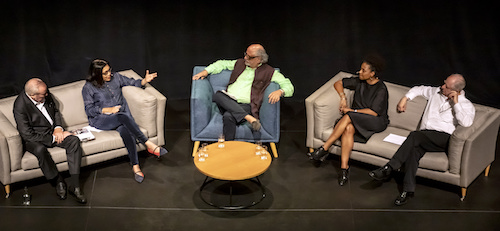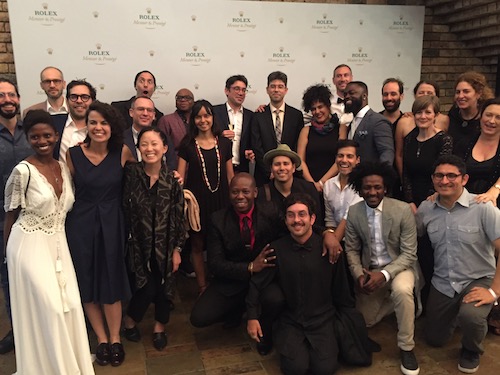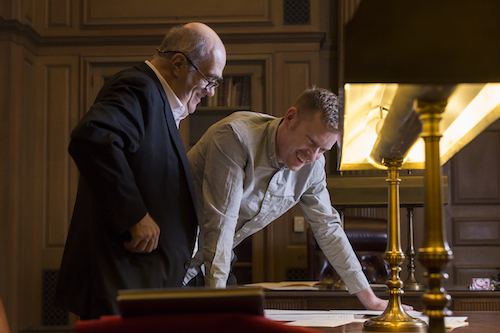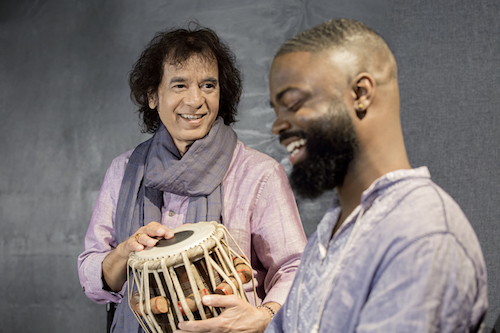 An unprecedented level of intellectual debate about the arts stirred South Africa last weekend at the Rolex Mentor & Protégé event.
An unprecedented level of intellectual debate about the arts stirred South Africa last weekend at the Rolex Mentor & Protégé event.
With more than 100 creative artists from around the world gathering to perform, exhibit and debate, it was a stimulating and fiercely inspiring celebration. And a reminder that South Africa is generally starved of such levels of intellectual artistic discourse, as the Baxter Theatre’s CEO and Artistic Director Lara Foot reflected.

The Rolex Arts Initiative is lauded as the world’s most successful mentor and protégé programme, and African artists in a variety of fields have benefited. Foot herself was a protégé in 2004, mentored by the late Sir Peter Hall, founder of the Royal Shakespeare Company. The whole event was brought to South Africa because of Foot’s involvement, and she said she was honoured and delighted to welcome the 2020 event to the Baxter Theatre. The weekend celebrated the current mentors and protégées coming to the formal end of their collaboration, and the start of the next international pairings.
The initiative sees master craftsmen working with a young, gifted protégé in the same field for two years of creative collaboration and one-to-one mentoring. It’s often life-changing, as it was for Cape Town dancer Londiwe Khoza, who was mentored in 2018/19 by Israeli choreographer Ohad Naharin. Khoza joined the Batsheva Dance Company in Tel Aviv for the mentoring, and still lives and works in Israel today.

During the Arts Initiative weekend there were conversations that demanded deep concentration as philosophical ideas were strewn around. At a debate about inspiration and muses, American theatre director Robert Wilson gave some insight into why his play Deafman Glance lasted for seven hours and was silent. Wilson described how he once saved a deaf, mute 13-year old boy from being beaten by a policeman. When he saw the appalling living conditions of the parentless boy he adopted him, and his work was influenced by his silence and his different way of seeing things.
Wilson said plays shouldn’t be about religion or politics and should only be about one thing, otherwise they become too complicated. But you got the sense he was being deliberately provocative. Film director Mira Nair took him up on it, saying she came from a different direction and believed that film and theatre should deal with issues that bother the world. “The question I keep asking is how can art reflect this world and change it in some way,” she said.
 South Africa’s own William Kentridge was amusing and self-effacing, saying that his theatre work always has too much mess. “I think this time it’s going to be clear and simple, then I find there are five more actors and three more pieces and I can’t resist trying to put it all together,” he said. “It's a kind of chattering of the mind, an anti-zen. If I try to find a yoga-like stillness there’s just sleep - with some very interesting dreams.”
South Africa’s own William Kentridge was amusing and self-effacing, saying that his theatre work always has too much mess. “I think this time it’s going to be clear and simple, then I find there are five more actors and three more pieces and I can’t resist trying to put it all together,” he said. “It's a kind of chattering of the mind, an anti-zen. If I try to find a yoga-like stillness there’s just sleep - with some very interesting dreams.”
His latest production, The Head & the Load, is an ambitious exploration of Africa’s role in the First World War with 38 performers using music, text, dance, film projections, mechanised sculptures and shadow play. “It’s about the First World War but it started as an opera with the argument is it possible to make a historic piece that used collage rather than narrative as a way to understand history,” Kentridge said.
 Then came a question from the audience about cultural approbation, or who should be allowed to tell the stories of other people, It was quashed quickly by Prof. Homi K Bhabha, who asked who should have the power to give that permission, and declared that if people weren’t allowed to tell something as a witness, one day when you need a witness, people will remain silent.
Then came a question from the audience about cultural approbation, or who should be allowed to tell the stories of other people, It was quashed quickly by Prof. Homi K Bhabha, who asked who should have the power to give that permission, and declared that if people weren’t allowed to tell something as a witness, one day when you need a witness, people will remain silent.
For another session, three young Cape Town actors read a section of a new novel by Irish writer Colin Barrett. Barrett is transitioning from a short story writer to a novelist under the mentorship of writer and public intellectual Colm Tóibín.
Barrett described the mentoring process as being more exploratory than prescriptive, with Tóibín helping him to grow and develop and gain confidence by talking about his own experiences and how he’s resolved problems in the past.
The weekend ended with a drumming finale that raised the roof, as Indian tabla drummer Zakir Hussain played alongside his protégé, the American drummer Marcus Gilmore. The musical ebb and flow and the playful grin lighting up Hussain’s face embodied the nurturing, proud relationship between the old masters and their younger successors, and the joy it gives to both.
For more details, click here: